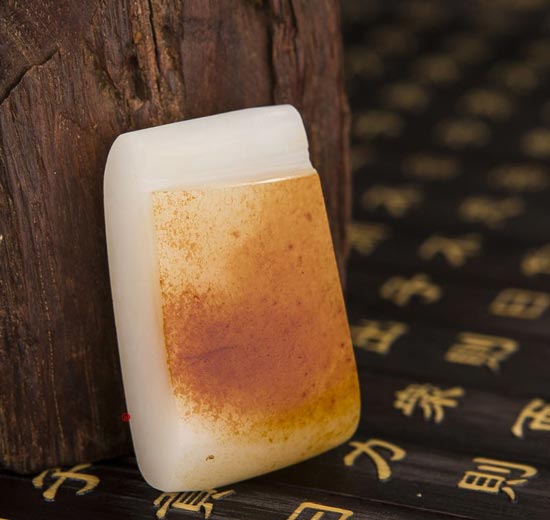
Privacy statement: Your privacy is very important to Us. Our company promises not to disclose your personal information to any external company with out your explicit permission.
Hetian jade has a broad and narrow sense. In the narrow sense, it refers to Xinjiang Hetian jade. In a broad sense, it also includes Russian jade, Qinghai jade, and Korean jade. Hetian jade has no difference in mineral composition and chemical composition, and only slightly differs in impurity minerals and trace elements, and each has its own characteristics.
First, Xinjiang Hetian jade
Xinjiang Hetian jade is mainly distributed in the Kunlun Mountains and the Altun Mountains under the jurisdiction of Xinjiang. The color of Xinjiang white jade is white and the body is like gelatin. The texture of the cloud is short and dense, the light is intrinsic, the texture is warm and delicate, the oil is very strong, the tremolite content is almost 99%, and the value is very high.
Xinjiang Hetian jade is produced in the Kunlun Mountains and the Altun Mountains area, and is produced in the Hetian area (Yecheng County, Qiemo County, Ruoqiang County, Yutian County, etc.), and is considered to be the best place of Baiyu; the subdivision can be divided into mountain materials. , mountain water, Gobi material and seed material, the texture is the best in Xinjiang Hetian jade seed material, followed by Gobi material, then mountain water, mountain material. Because of excessive mining, the seed and Gobi material sources have been exhausted, especially in recent years, the good materials are even rarer, and the price has once increased.
Second, Hetian jade
Russian Hetian jade is abbreviated as “Russian material” and is produced in Hetian jade of Russia. The output form can also be divided into mountain material, seed material and mountain water material. However, there are few seeds in Russian materials, mostly mountain water and mountain materials. With the increasing scarcity of Xinjiang materials, the value of white jade in Russian materials has gradually increased. More than 90% of the high-end white jade on the market is Russian.
Russian Hetian jade is produced in the Ural Mountains of Siberia and is not formed on the same geological belt as Xinjiang Hetian jade. Russian white jade, mainly based on mountain materials, the texture is not as dense and fine as the materials, the luster is not as soft as the Xinjiang material, but the color is very pure, less variegated, whiteness is better, but because of lack of moisture, performance A kind of "dry white" and "dead white".

Third, Hetian Yuqinghai
Qinghai Hetian, also known as Qinghai Jade or Kunlun Jade, is one of the common types of generalized Hetian jade in the market. It is produced in the eastern margin of the Kunlun Mountains and is part of Qinghai Province. It is located in a metallogenic belt in Xinjiang Hetian Yutong, east of Kunlun Mountain. Kunlun jade, the northern part of the mountain and the jade of the mountain, the distance between the two is about three hundred kilometers, and there is a close relationship on the geological structure background.
Therefore, Kunlun jade and Xinjiang Hetian jade are basically the same in terms of material composition, origin status and structural structure. It can be described as the twin compatriots in nature. The Qinghai material of the old pit is delicate and can be compared with the Xinjiang Hetian jade mountain. It is beautiful, but the texture of the new pit is worse, it is easy to change color and yellow, so the market has not been good in recent years.
Qinghai white jade, mainly mountain material, its mineral composition is similar to the white jade of Xinjiang Hetian, the characteristics are very similar, but the hardness and density are slightly lower than the Xinjiang Hetian material. Some Qinghai white jade products have white transparent "ribs" inside, called "water lines" in the line, distributed in strips. Some of the white jade in Xinjiang also have "water lines", but not as clear and dense as Qinghai white jade. However, the transparency of Qinghai material is high, and the jade fluorescing is so smart and transparent, and its oiliness is poor. Its color is somewhat grayish and dark, and it is not as white as white in Hetian.
Fourth, Korean material
Korean material is a generalized Hetian Yuqing Yushan material. Its main producing area is Chuncheon in the southern part of the Korean peninsula. It is produced in the local serpentinite and is mostly blue-yellow and brown. The powder is not very good. The chemical composition of Korean material is basically similar to that of Xinjiang Hetian jade. The hardness and density are close to Xinjiang Hetian jade, but slightly smaller, the hardness is about 5.5. It can be said that the price of Korean material is the lowest in Hetian jade, and the high-end sheep fat jade can be 10,000 times worse.
South Korea and Hetian jade are mostly large-sized mountain materials. Its appearance is similar to that of Xinjiang white jade, but the white is yellowish yellow, the stone is thicker, the luster is not soft, the jade is not as warm as the Xinjiang white jade, and there is no delicate and warm feeling.
November 15, 2023
November 10, 2023
Mail an Lieferanten
November 15, 2023
November 10, 2023
October 18, 2022

Privacy statement: Your privacy is very important to Us. Our company promises not to disclose your personal information to any external company with out your explicit permission.

Fill in more information so that we can get in touch with you faster
Privacy statement: Your privacy is very important to Us. Our company promises not to disclose your personal information to any external company with out your explicit permission.